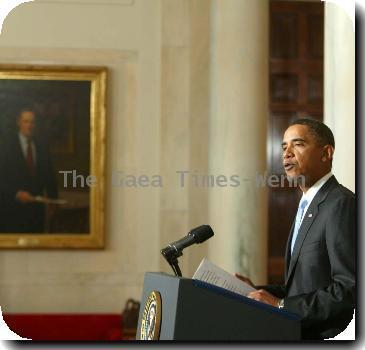Democratic jobs bill faces key hurdle; Republicans may filibuster over Reid tactics
By Andrew Taylor, APMonday, February 22, 2010
Democratic jobs bill faces key hurdle
WASHINGTON — Republicans are trying to stall a scaled-back jobs bill in the hope of adding more tax cuts now that Democrats need GOP help to advance their own and President Barack Obama’s agenda in an election year.
The bill, by Majority Leader Harry Reid, D-Nev., is a far smaller measure than Obama’s $862 billion economic stimulus bill enacted a year ago. It’s also significantly smaller than a rival bipartisan bill unveiled earlier this month by two senior senators.
But the measure still features the key job-producing element of that bipartisan accord: Exempting businesses hiring the unemployed from Social Security payroll taxes through December and giving them another $1,000 credit if new workers stay on the job a full year.
The wrangling over the jobs issue provides the first major test for both Democrats and Republicans of how to make the Senate work now that Democrats can no longer be guaranteed of defeating GOP filibusters. Assuming Republicans succeed in stalling the measure, Reid likely will offer concessions, a pattern that could play out on a host of issues between now and the November elections.
Though employers seldom make hiring decisions on the basis of tax breaks, economist Mark Zandi says the measure could potentially spur 250,000 new private-sector jobs. That’s still less than 4 percent of the 8.4 million jobs lost in the recession.
Reid’s bill needs 60 votes to defeat a GOP filibuster and advance to a final vote later this week. But his Democratic caucus controls 59 votes, and New Jersey Democrat Frank Lautenberg is ill and expected to be absent.
The White House said Monday that the administration strongly supports Reid’s bill but that it wants additional measures to create jobs. Among Obama’s jobs proposals are a $250 payment to Social Security recipients, $25 billion in help for cash-strapped states and redirecting $30 billion in Wall Street bailout money to help community banks lend to small businesses.
“It’s a good first step,” Obama senior adviser David Axelrod said. “There’s no doubt we need to do more.”
Republicans and some Democrats are unhappy that Reid abruptly dumped about $70 billion worth of tax breaks for businesses and individuals, help for the unemployed and additional Medicare payments to doctors from a compromise measure unveiled earlier this month by Sens. Max Baucus, D-Mont., and Charles Grassley, R-Iowa, the chairman and ranking Republican on the Finance Committee.
In addition to the Social Security tax break, the surviving bill would still renew highway programs through December, deposit $20 billion in the highway trust fund and extend a tax break for small businesses buying new equipment.
Reid said on a Nevada interview program last week that he originally envisioned a narrowly tailored jobs measure like the one pending now but that too many provisions not directly related to jobs were added during private negotiations among the members of the Finance panel.
The larger Finance panel measure included about $33 billion in popular tax breaks, including an income tax deduction for sales and property taxes and a business tax credit for research and development, would be extended through 2010. Those ideas have sweeping support among lawmakers and have been routinely renewed for years.
At the same time, however, the embattled majority leader is facing a Feb. 28 deadline. That’s when key provisions like unemployment insurance for the long-term jobless and health insurance subsidies for the unemployed expire. Also set to lapse are key provisions of the anti-terror Patriot Act, as well as laws helping small businesses and satellite television providers.
Business groups say companies are unlikely to hire workers just to receive a tax break. But economist Zandi of Moody’s Economy.com has said that the core provision of Reid’s bill, the tax breaks for businesses making new hires, has the potential to create 250,000 new hires this year. At about $45,000 per additional job, that means most of the tax benefits would go to companies that would have hired new workers anyway.
“Obviously it’s not very efficient,” Zandi said. “It’s something worthwhile doing as an insurance policy but it’s something one would want to do in any other circumstance.”
Other ideas on the Democrats’ legislative agenda to boost jobs include money for retrofitting homes to make them more energy efficient, help for state governments to retain teaching jobs and help for small businesses.
The bill would be paid for in part by a crackdown on international tax cheats, an issue the Internal Revenue Service and the Obama administration have embraced. Also, the bill would delay, until 2020, a tax break for multinational companies that pay foreign taxes. The tax break was passed in 2004 but has never taken effect because lawmakers keep delaying it to raise revenue.
____
AP White House Correspondent Jennifer Loven contributed to this report.
Tags: Barack Obama, Filibusters, Geography, North America, Personnel, Political Organizations, Political Parties, United States, Washington


